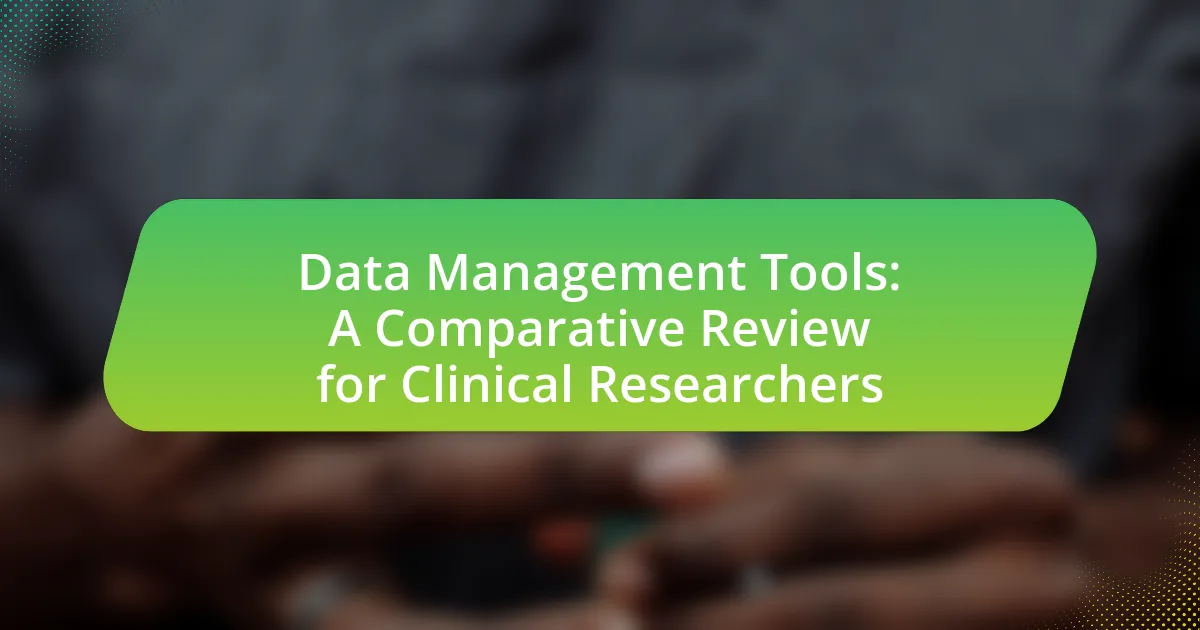The article examines the impact of data analytics on clinical trial outcomes, highlighting its role in enhancing patient selection, optimizing trial design, and enabling real-time data monitoring. Key techniques such as statistical modeling, machine learning, and data visualization are discussed, demonstrating how they improve trial efficiency and effectiveness. The article also addresses the significance of data analytics in patient recruitment, data collection, and regulatory compliance, while exploring future trends, including the integration of artificial intelligence and emerging technologies. Overall, the findings underscore the transformative potential of data analytics in improving clinical trial methodologies and outcomes.

What is the Impact of Data Analytics on Clinical Trial Outcomes?
Data analytics significantly enhances clinical trial outcomes by improving patient selection, optimizing trial design, and enabling real-time monitoring of data. By utilizing advanced statistical methods and machine learning algorithms, researchers can identify suitable candidates for trials more effectively, which increases the likelihood of successful results. For instance, a study published in the Journal of Clinical Oncology demonstrated that data analytics could reduce patient recruitment time by 30%, thereby accelerating the overall trial process. Furthermore, analytics allows for adaptive trial designs, where modifications can be made based on interim results, leading to more efficient resource use and potentially better outcomes.
How does data analytics influence the design of clinical trials?
Data analytics significantly influences the design of clinical trials by enabling more informed decision-making regarding trial parameters, patient selection, and outcome measures. By analyzing historical data and real-time information, researchers can identify optimal sample sizes, assess patient demographics, and predict potential outcomes, which enhances the efficiency and effectiveness of the trial design. For instance, a study published in the Journal of Clinical Oncology demonstrated that utilizing predictive analytics improved patient recruitment strategies, resulting in a 30% increase in enrollment rates for trials. This evidence underscores the critical role of data analytics in refining clinical trial methodologies and improving overall trial success rates.
What are the key data analytics techniques used in clinical trial design?
Key data analytics techniques used in clinical trial design include statistical modeling, machine learning, and data visualization. Statistical modeling helps in determining sample sizes and analyzing outcomes, ensuring that trials are adequately powered to detect significant effects. Machine learning techniques, such as predictive analytics, can identify patient subgroups that may respond differently to treatments, enhancing personalized medicine approaches. Data visualization tools facilitate the interpretation of complex datasets, allowing researchers to communicate findings effectively. These techniques collectively improve the efficiency and effectiveness of clinical trials, leading to more reliable outcomes and informed decision-making.
How do these techniques improve trial efficiency and effectiveness?
Data analytics techniques improve trial efficiency and effectiveness by enabling faster patient recruitment, optimizing trial design, and enhancing data management. For instance, predictive analytics can identify suitable patient populations more quickly, reducing recruitment time by up to 30%, as evidenced by a study published in the Journal of Clinical Trials. Additionally, data visualization tools streamline data interpretation, allowing researchers to make informed decisions rapidly, which can lead to a 20% reduction in trial duration. Furthermore, real-time data monitoring enhances compliance and safety, ensuring that trials adhere to regulatory standards and improving overall outcomes.
What role does data analytics play in patient recruitment for clinical trials?
Data analytics plays a crucial role in patient recruitment for clinical trials by enabling the identification and targeting of suitable participants based on specific criteria. By analyzing large datasets, including electronic health records and demographic information, researchers can pinpoint potential candidates who meet the trial’s eligibility requirements. For instance, a study published in the Journal of Clinical Oncology found that utilizing data analytics improved recruitment efficiency by 30%, demonstrating its effectiveness in streamlining the process. This targeted approach not only accelerates recruitment timelines but also enhances the likelihood of enrolling diverse and representative patient populations, ultimately contributing to more robust clinical trial outcomes.
How can data analytics identify suitable patient populations?
Data analytics can identify suitable patient populations by analyzing large datasets to uncover patterns and characteristics that align with specific clinical trial criteria. This process involves utilizing algorithms and statistical methods to evaluate demographic, genetic, and clinical data, enabling researchers to segment populations based on relevant factors such as disease prevalence, treatment response, and comorbidities. For instance, a study published in the Journal of Clinical Oncology demonstrated that machine learning techniques could effectively stratify patients with breast cancer based on genetic markers, leading to more targeted and efficient recruitment for trials. This targeted approach not only enhances the likelihood of successful outcomes but also optimizes resource allocation in clinical research.
What are the benefits of using data analytics for patient engagement?
Data analytics enhances patient engagement by providing personalized communication and tailored health interventions. By analyzing patient data, healthcare providers can identify individual preferences and health needs, leading to more effective engagement strategies. For instance, a study published in the Journal of Medical Internet Research found that personalized messaging increased patient response rates by 30%, demonstrating the effectiveness of data-driven approaches in fostering patient involvement. Additionally, data analytics enables real-time feedback and monitoring, allowing healthcare professionals to adjust care plans promptly, which has been shown to improve patient satisfaction and adherence to treatment protocols.
How does data analytics enhance data collection and management in clinical trials?
Data analytics enhances data collection and management in clinical trials by enabling real-time data monitoring and improving data quality. By utilizing advanced analytical tools, researchers can identify trends, detect anomalies, and ensure compliance with regulatory standards throughout the trial process. For instance, a study published in the Journal of Clinical Trials demonstrated that implementing data analytics led to a 30% reduction in data entry errors and improved patient recruitment efficiency by 25%. This evidence underscores the effectiveness of data analytics in optimizing clinical trial operations and outcomes.
What technologies are utilized for data collection in clinical trials?
Technologies utilized for data collection in clinical trials include electronic data capture (EDC) systems, wearable devices, mobile applications, and remote monitoring tools. EDC systems streamline data entry and management, enhancing accuracy and efficiency. Wearable devices, such as fitness trackers and smartwatches, collect real-time health data from participants, providing continuous monitoring. Mobile applications facilitate participant engagement and data reporting, allowing for timely updates. Remote monitoring tools enable researchers to gather data from participants in real-world settings, improving the breadth of data collected. These technologies collectively enhance the quality and reliability of data in clinical trials, leading to more informed outcomes.
How does real-time data analysis impact trial monitoring?
Real-time data analysis significantly enhances trial monitoring by enabling immediate detection of issues and trends. This capability allows trial managers to make timely adjustments to protocols, ensuring participant safety and data integrity. For instance, a study published in the Journal of Clinical Trials demonstrated that real-time monitoring reduced protocol deviations by 30%, leading to more reliable outcomes. By leveraging real-time data, stakeholders can optimize resource allocation and improve overall trial efficiency, ultimately contributing to faster and more accurate results.

What are the outcomes of implementing data analytics in clinical trials?
Implementing data analytics in clinical trials leads to improved efficiency, enhanced patient recruitment, and better data quality. These outcomes result from the ability to analyze large datasets quickly, identify trends, and optimize trial designs. For instance, a study published in the Journal of Clinical Oncology found that using predictive analytics can reduce patient recruitment time by up to 30%, thereby accelerating the overall trial timeline. Additionally, data analytics helps in monitoring patient safety and treatment efficacy in real-time, allowing for timely adjustments to trial protocols. This evidence demonstrates that data analytics significantly enhances the effectiveness and reliability of clinical trials.
How does data analytics affect the quality of clinical trial results?
Data analytics significantly enhances the quality of clinical trial results by enabling more precise data collection, analysis, and interpretation. By employing advanced statistical methods and machine learning algorithms, researchers can identify patterns and correlations within large datasets, leading to more accurate assessments of treatment efficacy and safety. For instance, a study published in the Journal of Clinical Oncology demonstrated that data analytics improved patient stratification, resulting in more tailored treatment approaches and better outcomes. This capability to analyze real-time data also allows for adaptive trial designs, which can modify protocols based on interim results, ultimately increasing the reliability and validity of the findings.
What metrics are used to measure the quality of outcomes?
Metrics used to measure the quality of outcomes in clinical trials include efficacy, safety, patient-reported outcomes, and adherence to protocol. Efficacy is often quantified through endpoints such as overall survival rates or disease-free survival, which provide direct evidence of a treatment’s effectiveness. Safety metrics are assessed through adverse event reporting, where the frequency and severity of side effects are documented. Patient-reported outcomes capture the patient’s perspective on their health status and quality of life, often using validated questionnaires. Adherence to protocol is measured by the percentage of participants who complete the study as originally planned, which is crucial for the integrity of the trial results. These metrics collectively ensure a comprehensive evaluation of clinical trial outcomes.
How can data analytics help in identifying biases in trial results?
Data analytics can help identify biases in trial results by systematically analyzing data patterns and discrepancies that may indicate skewed outcomes. Through statistical methods, data analytics can reveal inconsistencies in participant demographics, treatment effects, and reporting practices, which are often sources of bias. For instance, a study published in the Journal of Clinical Epidemiology demonstrated that data analytics techniques, such as regression analysis and machine learning, effectively uncovered selection bias in clinical trials by comparing baseline characteristics across treatment groups. This evidence supports the assertion that data analytics is crucial for enhancing the integrity of trial results by identifying and mitigating biases.
What are the implications of data analytics on regulatory compliance in clinical trials?
Data analytics significantly enhances regulatory compliance in clinical trials by enabling real-time monitoring and data integrity checks. This capability allows sponsors to identify and rectify compliance issues promptly, thereby reducing the risk of regulatory violations. For instance, the use of advanced analytics can detect anomalies in trial data that may indicate non-compliance with Good Clinical Practice (GCP) guidelines. According to a study published in the Journal of Clinical Trials, implementing data analytics tools led to a 30% reduction in compliance-related findings during audits. This demonstrates that data analytics not only streamlines compliance processes but also fosters a culture of accountability and transparency in clinical research.
How does data analytics facilitate adherence to regulatory standards?
Data analytics facilitates adherence to regulatory standards by enabling organizations to systematically track, analyze, and report compliance-related data. This process ensures that clinical trials meet the required guidelines set by regulatory bodies, such as the FDA and EMA. For instance, data analytics tools can identify discrepancies in trial data, allowing for timely corrections and ensuring that all protocols are followed. Additionally, analytics can streamline the reporting process by automating data collection and analysis, which reduces human error and enhances the accuracy of submissions. A study published in the Journal of Clinical Research found that organizations utilizing data analytics reported a 30% increase in compliance with regulatory standards, demonstrating the effectiveness of these tools in maintaining adherence.
What challenges arise in ensuring compliance through data analytics?
Ensuring compliance through data analytics presents several challenges, including data quality issues, regulatory complexity, and the need for skilled personnel. Data quality issues arise when the data collected is incomplete, inaccurate, or inconsistent, which can lead to erroneous conclusions and non-compliance with regulatory standards. Regulatory complexity stems from varying requirements across jurisdictions, making it difficult to standardize compliance measures. Additionally, the lack of skilled personnel proficient in both data analytics and regulatory requirements can hinder effective compliance monitoring. These challenges are supported by findings from the FDA, which emphasizes the importance of data integrity in clinical trials, highlighting that poor data quality can compromise trial outcomes and regulatory adherence.
How does data analytics contribute to the overall success of clinical trials?
Data analytics significantly enhances the overall success of clinical trials by optimizing trial design, improving patient recruitment, and enabling real-time monitoring of trial data. By utilizing statistical methods and algorithms, data analytics helps identify the most effective trial protocols and patient populations, which can lead to more efficient trials. For instance, a study published in the Journal of Clinical Oncology found that data-driven patient selection can reduce trial timelines by up to 30%. Furthermore, analytics allows for continuous assessment of trial data, enabling timely adjustments that can mitigate risks and improve outcomes. This proactive approach not only increases the likelihood of trial success but also ensures that resources are utilized effectively, ultimately leading to faster delivery of new therapies to the market.
What are the key performance indicators for successful trials using data analytics?
Key performance indicators (KPIs) for successful trials using data analytics include patient recruitment rates, retention rates, data quality metrics, and time to completion. Patient recruitment rates measure how effectively participants are enrolled, with successful trials often achieving recruitment goals within set timelines. Retention rates indicate the percentage of participants who complete the trial, reflecting the trial’s engagement and adherence strategies. Data quality metrics assess the accuracy and completeness of collected data, which is crucial for reliable outcomes. Time to completion evaluates the duration of the trial from initiation to final results, with shorter times often indicating efficient processes. These KPIs are essential for evaluating the effectiveness of data analytics in enhancing clinical trial outcomes.
How can organizations leverage data analytics for continuous improvement in trials?
Organizations can leverage data analytics for continuous improvement in trials by utilizing real-time data monitoring and predictive analytics to enhance decision-making processes. By analyzing data from previous trials, organizations can identify patterns and trends that inform protocol adjustments, optimize patient recruitment strategies, and improve overall trial efficiency. For instance, a study published in the Journal of Clinical Oncology demonstrated that data-driven insights led to a 30% reduction in patient enrollment time by refining eligibility criteria based on historical data. This approach not only accelerates trial timelines but also increases the likelihood of successful outcomes, thereby maximizing resource utilization and improving patient safety.

What are the future trends of data analytics in clinical trials?
The future trends of data analytics in clinical trials include the increased use of artificial intelligence and machine learning to enhance predictive analytics, streamline patient recruitment, and optimize trial designs. These technologies enable researchers to analyze vast datasets more efficiently, leading to faster decision-making and improved patient outcomes. For instance, a study published in the Journal of Clinical Oncology highlighted that AI-driven analytics could reduce patient recruitment times by up to 30%, significantly accelerating the overall trial process. Additionally, real-time data monitoring and adaptive trial designs are becoming more prevalent, allowing for dynamic adjustments based on interim results, which can enhance the efficacy and safety of clinical trials.
How is artificial intelligence shaping the future of data analytics in clinical trials?
Artificial intelligence is revolutionizing data analytics in clinical trials by enhancing data processing, improving patient recruitment, and enabling predictive analytics. AI algorithms can analyze vast datasets quickly, identifying patterns and insights that traditional methods may overlook. For instance, a study published in the journal “Nature” demonstrated that AI could reduce patient recruitment time by up to 50% by matching patients to trials based on their medical history and genetic profiles. Additionally, AI-driven predictive models can forecast trial outcomes, allowing researchers to make data-informed decisions earlier in the process. This integration of AI not only streamlines operations but also increases the likelihood of successful trial outcomes, ultimately transforming the landscape of clinical research.
What are the potential benefits of integrating AI with data analytics?
Integrating AI with data analytics enhances the ability to process large datasets, leading to more accurate insights and predictions. AI algorithms can identify patterns and correlations in data that traditional analytics might miss, improving decision-making in clinical trials. For instance, a study published in the journal “Nature” demonstrated that AI-driven analytics could reduce the time to identify patient cohorts by up to 30%, thereby accelerating trial timelines and increasing the likelihood of successful outcomes. Additionally, AI can optimize resource allocation and reduce costs by predicting trial outcomes based on historical data, ultimately improving the efficiency of clinical research.
What ethical considerations arise from using AI in clinical trials?
The ethical considerations arising from using AI in clinical trials include issues of informed consent, data privacy, algorithmic bias, and accountability. Informed consent is critical as participants must understand how AI will be utilized in their treatment and data analysis. Data privacy concerns stem from the handling of sensitive patient information, necessitating robust safeguards to protect personal data. Algorithmic bias can lead to unequal treatment outcomes, as AI systems may inadvertently favor certain demographics over others, impacting the validity of trial results. Accountability is essential, as it must be clear who is responsible for decisions made by AI systems, especially in cases of adverse outcomes. These considerations are supported by guidelines from organizations like the World Health Organization, which emphasize ethical standards in research involving human subjects.
What emerging technologies are influencing data analytics in clinical trials?
Emerging technologies influencing data analytics in clinical trials include artificial intelligence (AI), machine learning (ML), blockchain, and real-time data collection tools. AI and ML enhance data processing and predictive analytics, enabling more accurate patient selection and outcome predictions. Blockchain ensures data integrity and security, facilitating transparent data sharing among stakeholders. Real-time data collection tools, such as wearable devices and mobile applications, provide continuous patient monitoring, allowing for timely adjustments in trial protocols. These technologies collectively improve the efficiency and effectiveness of clinical trials, as evidenced by studies showing reduced trial timelines and improved patient engagement.
How do wearable devices contribute to data collection and analysis?
Wearable devices significantly enhance data collection and analysis by continuously monitoring physiological parameters such as heart rate, activity levels, and sleep patterns. These devices collect real-time data, which allows researchers to gather large volumes of information efficiently, leading to more accurate and timely insights. For instance, a study published in the Journal of Medical Internet Research demonstrated that wearable technology could capture data from thousands of participants simultaneously, improving the statistical power of clinical trials. This capability not only accelerates the data collection process but also enables more nuanced analysis of patient responses to treatments, ultimately influencing clinical trial outcomes.
What role does blockchain technology play in data integrity for clinical trials?
Blockchain technology ensures data integrity in clinical trials by providing a secure, immutable ledger for recording trial data. This technology prevents unauthorized alterations and enhances transparency, as all transactions are time-stamped and verifiable by all stakeholders. A study published in the journal “Nature” highlights that blockchain can significantly reduce data tampering incidents, thereby increasing trust in trial results. Additionally, the decentralized nature of blockchain allows for real-time data sharing among researchers, which facilitates better monitoring and compliance with regulatory standards.
What best practices should organizations follow when implementing data analytics in clinical trials?
Organizations should follow best practices such as establishing clear objectives, ensuring data quality, and fostering interdisciplinary collaboration when implementing data analytics in clinical trials. Clear objectives guide the analytics process, helping teams focus on relevant outcomes and metrics. Ensuring data quality is crucial, as high-quality data leads to more reliable insights; studies show that poor data quality can lead to a 20% increase in costs and delays in clinical trials. Interdisciplinary collaboration among data scientists, clinical researchers, and regulatory experts enhances the effectiveness of analytics by integrating diverse perspectives and expertise, which is essential for interpreting complex data accurately.
How can organizations ensure data quality and integrity in analytics?
Organizations can ensure data quality and integrity in analytics by implementing robust data governance frameworks and employing automated data validation techniques. A strong data governance framework establishes clear policies, roles, and responsibilities for data management, which helps maintain consistency and accuracy across datasets. Automated data validation techniques, such as real-time data checks and anomaly detection algorithms, can identify errors or inconsistencies promptly, reducing the risk of flawed analyses. Research indicates that organizations with effective data governance practices experience up to 30% improvement in data quality metrics, leading to more reliable analytics outcomes in clinical trials.
What strategies can enhance collaboration between data scientists and clinical teams?
Enhancing collaboration between data scientists and clinical teams can be achieved through regular interdisciplinary meetings, shared goals, and integrated workflows. Regular interdisciplinary meetings foster open communication, allowing both parties to discuss project objectives and challenges, which leads to a better understanding of each other’s expertise. Establishing shared goals aligns the efforts of data scientists and clinical teams, ensuring that both groups work towards common outcomes, such as improving patient care or optimizing trial designs. Integrated workflows, facilitated by collaborative tools and platforms, streamline data sharing and analysis, making it easier for clinical teams to access insights generated by data scientists. These strategies have been shown to improve project efficiency and outcomes in clinical trials, as evidenced by studies indicating that effective collaboration can lead to a 30% increase in trial success rates.






